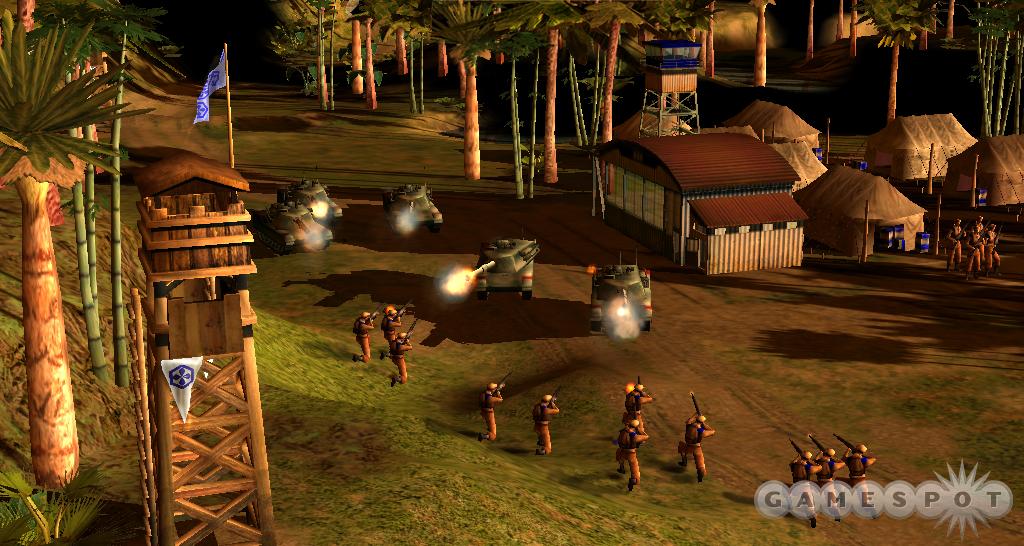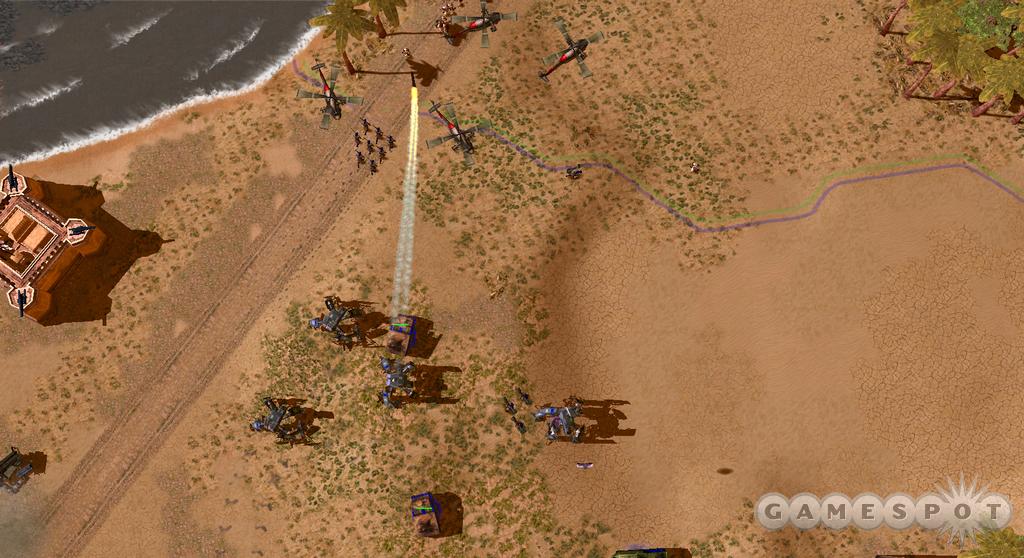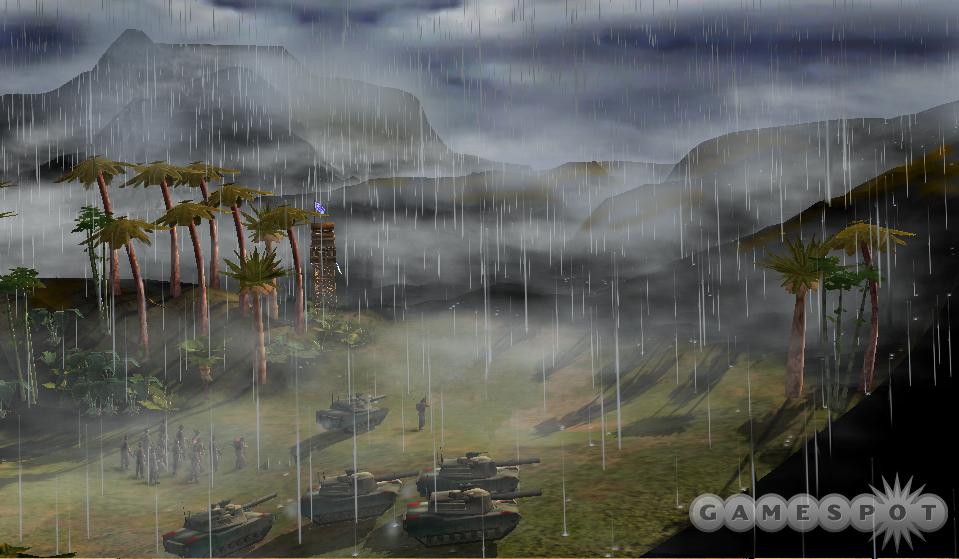Empire Earth 2 Impressions
We get the exclusive first look at the sequel to the hit real-time strategy game.
Empire Earth was a strategy game destined to do well. Designed by Rick Goodman, one of the creators of Age of Empires, Empire Earth basically took the huge scale of the classic turn-based strategy game Civilization and essentially translated it to real time. And in some ways, Empire Earth resembled Microsoft's Age of Empires games. Only, instead of focusing on just one part of human history, the game encapsulated all of it. You could usher a nation from the Stone Age to the futuristic robot age in the epic game, or you could choose a single epoch to play in, such as the age of Napoleon or World War I. This formula proved popular to gamers, and publisher Vivendi Universal touts that it has sold more than 2 million copies worldwide. Naturally, Vivendi has commissioned a sequel, and we were the first outsiders to be given a look at the game in development.

Empire Earth 2 is being created by Mad Doc Software, the Cambridge, Massachusetts-based development house that worked on The Art of Conquest expansion for the original game. (Goodman's Stainless Steel Studios is working on a new project.) In the gaming industry, an even-numbered sequel tends to be an enhanced version of the preceding game. So, in other words, the graphics engine and other features are usually recycled to save development costs and time. Not so in the case of Empire Earth 2. According to Ian Davis, Mad Doc's CEO, the development team has started from scratch. Empire Earth 2 will feature a new 3D graphics engine that will support all the latest DirectX 9 hardware features while also scaling down to support older machines. Additionally, the game will incorporate advanced, new artificial intelligence as well as new kinds of single- and multiplayer gameplay.
However, we've gotten ahead of ourselves. Empire Earth 2's epic game will run from 10,000 BC to about the 23rd century, with more ages--or eras--than the original game. You'll pick from between 14 different civilizations, with more than 370 unique units and 320 buildings. You'll start off with a small tribe, and you'll have to gather resources, expand your territory, and research new technologies, which will let you survive and advance through the ages. And when you begin to rub against your neighbors, you can deal with them militarily or diplomatically. The game will also have three single-player campaigns--covering early Korean history, middle German history, and modern US history--with more than 30 missions.
Empire Earth 2 will introduce the concept of territory to real-time strategy games. The maps will be pre-divided into a set number of territories, and if you capture one, it can tip the balance of power in your favor, because you'll then have access to all the resources in that territory. You'll also be able to use territory to great effect in the game's deep diplomacy system. For example, you can offer to trade territory in exchange for peace or an alliance, or you can grant harvesting rights in a territory to another faction that's looking for specific resources. In this case, you can give unlimited rights, or you can choose to "tax" a percentage of the resources gathered by this other faction. This way, someone can develop unused resources on your territory, and you can benefit from it.

One of the major goals for the game is to make the gameplay much more accessible, especially for beginning gamers and newcomers to real-time strategy. To this effect, Mad Doc is incorporating a couple of new features never before seen in a real-time strategy game. The first is the citizen manager, which is just what it sounds like. As the maps in Empire Earth 2 will be larger than in the original game, you will eventually have dozens, or maybe even hundreds, of citizens gathering the resources you need to run your empire. Micromanaging all these citizens would be too distracting--since you're usually busy crushing your opponents--so the citizen manager is a single screen that you can call up that details all the resources available to you, in addition to revealing the number of citizens tasked with gathering each resource. If you wish to shift citizens from gathering one resource to gathering another, all you need to do is pick them up from one resource and drop them on the other, and they'll automatically shift around on the map.
Drawing Arrows
The other interesting new feature is the war-planning system. In virtually all real-time strategy games, when you wish to attack, you have to select your units and click where you want them to go and what you want them to attack. Empire Earth's war-planning system will call up a map of the world, and like a military commander, you can actually plan your attack by drawing arrows and circles on the screen. This way, you can designate multiple avenues of attack and give special orders to certain units. So, for example, you can order your bombers to specifically target an important bridge. When you drop back to the game, your units will carry out your attack plans. You can even use the system to coordinate your attack with allies by indicating what direction you wish them to attack from. It's certainly a cool concept, and it's so obvious that you wonder why it hasn't been implemented in an RTS game before. 
Once again, the huge time span of the game will allow a huge variety of units, and Davis showed us some of the latter-era units, including stealth bombers and giant robots. Units will also have an array of different abilities. The spy, for instance, will not only be able to infiltrate enemy territory but also contaminate enemy resources (infecting any civilians who come into contact with that specific resource or resources), decontaminate your own resources, sabotage enemy buildings, gather intelligence, and disable enemy outposts. Davis showed us how his spy penetrated an enemy's defenses and disabled a warning outpost. He then selected his tanks and charged straight into the heart of his enemy's base.
Weather will also play an important role in the game, since inclement weather will affect ground units and ground-air units. There will be snowstorms, monsoons, dust storms, and more, and they can all affect visibility as well as unit speed. Furthermore, if you establish outlying outposts, you'll receive warnings before the weather changes so that you can plan accordingly. We saw a sandstorm virtually shut down activity on a desert map, and it was a cool-looking effect, to boot.
Another interesting new feature is the crown system. Throughout history, there have been certain empires and nations that have clearly risen above the rest, including the Roman Empire, the British Empire, and the United States (which is the current, reigning superpower). The crown system is an attempt to model this in a real-time strategy game. There are three crowns, one each for military, economic, and imperial supremacy. Using a variety of criteria, the game will determine the leaders in each area and reward them with the respective crown. The crown will grant special bonuses and leader units, so the nation with the military crown may gain special powers, such as the Strategic Bombing Doctrine, which lets bombers inflict extra damage on opponents. However, after a certain amount of time, the game will again analyze the balance of power, and if another nation has risen to military prominence, you'll lose your military crown and will see it given to another.

In terms of opponents, Davis touts that the game will feature advanced, noncheating artificial intelligence, which means that computer opponents will play by the same rules you do, and they won't get any bonuses or special advantages that you can't get. Davis certainly knows something about AI; his doctorate is in Artificial Intelligence and Robotics, and he used to do robotics work for DARPA, the Department of Defense agency responsible for the Internet and stealth technology. If you're looking for a human opponent, Empire Earth 2 will have a multiplayer component, though Mad Doc isn't talking about details quite yet.
Vivendi and Mad Doc intend to show the game publicly for the first time at E3. Mad Doc has been working on the game since last year, and it's eager to show the world the results. The pieces certainly look like they're coming together quite well, and Mad Doc has plenty of time to finish the game, since Empire Earth 2 will ship in 2005.
Got a news tip or want to contact us directly? Email news@gamespot.com
Join the conversation